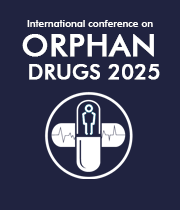Title : Emerging solutions for inclusive orphan drug clinical trials management
Abstract:
Orphan drugs, designed to treat rare diseases, face unique challenges in clinical trial management, primarily due to the small and dispersed patient populations. Inclusive orphan drug clinical trials are essential to ensure that all patient demographics benefit from these innovative treatments.
Often, the orphan drug clinical trials face significant challenges due to the small and diverse patient populations, making recruitment difficult and complicating standardization. These populations are often geographically dispersed, with language and cultural barriers further complicating patient engagement and trial inclusivity.
High development costs relative to the small patient populations lead to significant financial risks for sponsors, compounded by the high costs of specialized medical care and monitoring required during trials. Furthermore, the small sample sizes in these trials necessitate advanced statistical methods for meaningful data analysis, highlighting the urgent need for emerging and innovative solutions to overcome these obstacles and ensure the successful development of orphan drugs.
Innovative Solutions for Inclusive Orphan Drug Clinical Trials:
Decentralized Clinical Trials (DCTs): DCTs leverage telemedicine and remote monitoring, allowing participants to receive care and engage in the study from their homes. This approach eliminates travel to central sites, enhancing accessibility and convenience. By including individuals in remote or underserved areas, DCTs address geographical barriers and increase inclusivity.
Adaptive Trial Designs: Adaptive trial designs introduce flexibility by allowing modifications to protocols based on interim results. These allow flexible and rapid configuration. Changes can include dosage adjustments, patient selection criteria, or study endpoints. This benefits orphan drug trials with limited patient numbers, maximizing the value of data from each participant. Adaptive designs enhance efficiency and can shorten the time to conclusions.
Patient-Centric Recruitment Solutions: Effective recruitment is crucial for orphan drug trials, and patient-centric strategies can significantly enhance this process. By leveraging AI, clinical trial management platforms make clinical trials accessible even to the non-English speakers, patient registries, and advocacy groups help researchers reach potential participants directly. These methods increase awareness and foster community support among patients. Additionally, designing trials with patient needs in mind, such as reducing participation burden and providing support services, improves engagement and retention.
Real-World Evidence (RWE) Integration: Incorporating RWE from electronic health records, patient registries, and other sources can supplement traditional clinical trial data. This helps overcome the limitations of small sample sizes in orphan drug trials by providing a broader context for understanding a drug’s effectiveness and safety. RWE enriches the data pool, allowing for more robust analyses and informed decision-making.
Collaborative Networks and Platforms: Clinical Trial Management Platforms (CTMS) should enable global collaborative networks and data-sharing platforms. By pooling resources, expertise, and data, these networks facilitate more efficient and inclusive trial designs. These platforms exemplify the collaborative spirit, bringing together stakeholders from academia, industry, patient organizations, and regulatory bodies. These collaborations promote knowledge sharing and best practices, ensuring research efforts are more coordinated and impactful.
To conclude, by embracing innovations, researchers and sponsors can improve the chances of bringing life-saving therapies to those affected by rare diseases, ensuring no patient is left behind.
Audience Takeaway:
- Innovative solutions and modern ways of conducting clinical trials.
- Importance of decentralized trials and its impact in revolutionizing the orphan drugs landscape.
- Artificial Intelligence and the role of technology in streamlining healthcare and why it is the future of healthcare.
1. The audience will be able to identify obstacles in orphan drug trials, such as small patient pools and dispersed populations, to anticipate and overcome them effectively.
2. Apply innovative strategies like decentralized trials and patient-centric recruitment to enhance trial inclusivity and efficiency.
3. Utilize adaptive designs and real-world evidence integration for robust analyses and informed decision-making with limited patient samples.
4. Ensure no patient is overlooked by leveraging learned strategies to advance orphan drug development and access for all affected by rare diseases.
5. Establish collaborative networks to streamline trials and share resources, expertise, and data for improved outcomes.
6. By understanding the challenges and innovative solutions in orphan drug trials, professionals can optimize trial designs, leading to more efficient resource allocation and quicker drug development timelines.
7. Implementing patient-centric recruitment strategies based on the insights gained can result in higher participant engagement and recruitment rates, facilitating smoother trial execution and more representative study populations.
8. Learning about collaborative networks and platforms empowers professionals to connect with relevant stakeholders, fostering collaborations that streamline processes, share best practices, and accelerate orphan drug development efforts.
This research offers valuable insights and innovative solutions that other faculty members could incorporate into their own research or teaching in several ways:
1. Faculty can use the findings to expand their research into the field of orphan drug development, exploring novel methodologies and approaches to address the unique challenges faced in clinical trials for rare diseases.
2. The presentation provides rich material for teaching courses related to clinical trial management, drug development, or rare diseases. Faculty can integrate these real-world examples and innovative solutions into their curriculum to enhance student learning and engagement.
3. Faculty from different disciplines, such as medicine, public health, and statistics, can collaborate to further explore the implications of the proposed solutions. This interdisciplinary approach can lead to new research avenues and educational opportunities.
- Innovative methods like decentralized trials and adaptive designs streamline trial protocols, reducing administrative tasks and accelerating development.
- Strategies like AI-driven recruitment and patient-centric materials improve participant outreach, aiding designers in creating user-friendly and inclusive materials.
- The emphasis on data sharing and collaboration underscores the importance of clear data visualization tools, allowing designers to develop user-friendly dashboards and platforms for effective communication and decision-making.
List all other benefits:
1. Cost Efficiency: Optimization of trial designs and recruitment strategies reduces unnecessary expenses.
2. Ethical Considerations: Ensures equitable access to innovative treatments for all patient demographics.
3. Regulatory Compliance: Aligns with evolving regulatory guidelines for smoother approval processes.
4. Market Access: Facilitates broader market access for successful orphan drugs.
5. Research Advancement: Accelerates research advancements through collaboration and knowledge-sharing.


